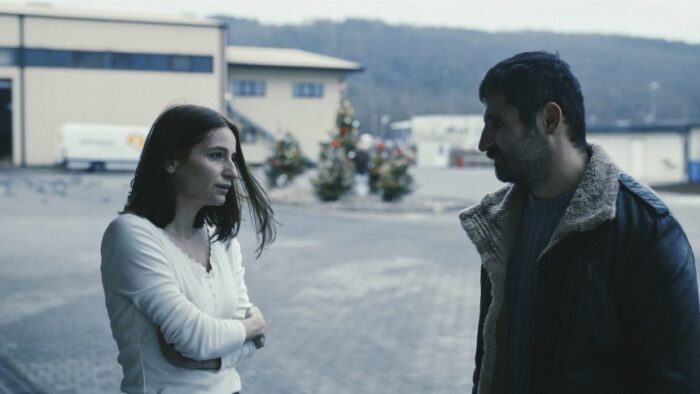One of the leading exponents of the neorealist style endemic to much of European Arthouse cinema, Romanian filmmaker Cristian Mungiu achieved international recognition with his 2007 feature 4 Months, 3 Weeks, 2 Days. That film unflinchingly dramatized the lengths women had to go to in order to terminate their pregnancies under the rule of Nicolae Ceausescu, and since then Mungiu has made it his stock in trade to explore the burdens of wrestling with moral and personal compromises and the complexities of navigating bureaucratic environs while so doing. R.M.N. takes a similar tack with its subject, following a rural community tearing itself apart over the arrival of a mere handful of Sri Lankan workers.
The local bakery has struggled to fill its factory floor, unable to pay wages that can compete with those abroad, with much of the local workforce having already sought more lucrative employment across borders. The forewoman Csilla (Judith State) is left no option but to hire migrant workers from overseas, who prove diligent employees and respectful and gracious guests in her town. The townsfolk however are irate. Fueled by a combination of ignorance, economic frustration, cultural instability and let’s be honest, mostly just outright racism, the locals rankle at the presence of the outsiders, and organize petitions and boycotts to force the bakery to send them home.
Though the cause of the conflict is almost entirely just plain bigotry, Mungiu looks deeper still, into the human feelings that fuel such bile, and which permit many to remain impartial despite the evident injustice. R.M.N.‘s second protagonist is Matthias (Marin Gregoire), a slaughterhouse worker who has himself just returned from working abroad, and who is shamefully guarding the fact that he assaulted his supervisor and has no job to return to after Christmas. Tension is already high between him and his wife (Macrina Barladeanu), there’s little love between them and they constantly clash over how best to raise their son Rudi. Matthias therefore divides his time between trying to toughen up his “sissy” child, romantically pursuing Csilla, and caring for his ailing father. Consequently, he has little room in his head to consider the rights of the migrants trying to earn a living in his home town, doing a job he himself has just turned down.

Mungiu juggles these parallel themes of toxic masculinity and xenophobia, seeing how the one feeds into the other and how both are rooted in insecurity and beleaguered identity. Would the Romanian locals be so vehemently opposed to the migrants if they didn’t have to cross westward borders to find gainful work themselves? The town is built on an uneasy detente between its Romanian and Hungarian residents, and identity is a vexed issue on both sides.
It so happens that concurrent with R.M.N.‘s release in the UK, there were run trailers for Ken Loach’s latest, The Old Oak Tree, which also dramatizes the friction that ensues when a small group of migrants (in that film’s case, refugees) arrives in a small rural village and upsets the racist ire of delicate xenophobic locals. Both films are told from the perspective of locals sympathetic to the newcomers and caught up defending them against their neighbors hatred. The similarity of the two film’s premises is hard to miss, and it must be said that the scene here where a town hall meeting is held to debate the issue is extremely Ken Loach in content. Still, though ignorance has no borders, Romania and England are very different places, and Loach and Mungiu have different aesthetic and storytelling sensibilities and the cultural specificity of the two works is marked, even as they wrestle with the same central issue.
Mungiu invests his drama with a strong sense of history, both local and personal. In his efforts to make a man of his son, Matthias takes him to make a campfire above the defunct quarry that used to keep the village’s menfolk employed locally, no longer, and to the boggy valley, which the quarry left flooded with bitter, undrinkable water. The outrage of the villagers may be frustratingly misguided, but there’s no question their community has suffered heavy blows at the hands of globalization, something they embrace, only when it suits them. R.M.N. forges a picture of local identity and a lost way of life, of farming, local tradition and community, much of it rooted in distrust of outsiders and of fresh insight.
These lead to moments of near-magic realism. R.M.N.‘s opening shows us Rudi alone in the woods, seeing something horrific and fleeing. The answer to this mystery arrives later, and conjures implications of mysticism, foresight, and tragedy. Despite the spartan and realist eye of his camera Mungiu indulges himself in archetypes of storytelling that suggest a fondness for folklore and fantasy. How well these elements integrate themselves into the story, I am not sure, but they flesh out the picture Mungiu paints and perhaps I’d have even liked to have seen more of them. Others might ask for less, but R.M.N. is a testy, unforgiving picture already, and these indulgences are to be forgiven in my eyes. There’s another telling aspect in Csilla’s character, playing cello with a local group, she spends her evening sitting up with her dog, listening to “Yumeji’s Theme” by Shigeru Umebayashi, a potent symbol of romantic longing. She has no respectful, dignified Tony Leung though. Just gruff, taciturn Matthias, a man who desires her, desperately needs the assurance her love gives him, yet clearly doesn’t understand her in the least.



